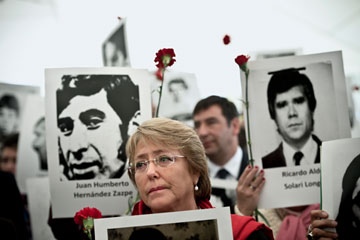
Bachelet at a ceremony marking the 40th anniversary of Chile's coup.
Several thousand people have packed the town square of Talagante, an hour south of Santiago, to listen to Michelle Bachelet's campaign speech. The former President of Chile, 62, is running for the job again, after a four-year break. She is already one of the most formidable figures in South American politics — a former Minister of Defense and, during her breather from domestic politics, inaugural executive director of U.N. Women, which seeks to empower women and girls worldwide. But on the campaign trail this year, as one local journalist put it, "she seems to be running for national grandmother." On the dais, she smiles broadly, ends most of her sentences with a homey "ain't it so?" and offers up a feel-good policy-platform like a tray of warm cookies.
She lists a few reasons why the crowd should vote for her party and not the other side, when someone shouts from below: "Because they have no memory!" A cheer erupts from the throng below. Bachelet nods smoothly in assent.
Memory — specifically, the memory of the coup that happened 40 years ago on Sept. 11, 1973, and of the 17 terrible years of military dictatorship that followed — has turned this particular campaign between Bachelet and her conservative rival Evelyn Matthei into an extraordinary collision of past, present and future. Take today's campaign rally: just down the road from Talagante is Lonquén, where 15 political prisoners were buried, some while still alive, in the smokestacks of a limestone quarry. Lonquén was just one of many secret interrogation, execution and burial grounds chosen by the military rulers. Bachelet herself was imprisoned and tortured as a young woman at one of those sites, as was her mother. Her father, air-force general Alberto Bachelet, died as a result of months of torture in an air-force detention center.
The man who was in charge of the Air Force Academy where he was detained? That would be General Fernando Matthei, Evelyn's father. The Mattheis and the Bachelets had been fast friends before the coup. The families were both stationed in Antofagasta, in the north. Michelle was a classmate of Evelyn's brother. She grew up calling Evelyn's father "Uncle Fernando."
Matthei, for her part, alternates between condemning the abuses of the junta and defending herself and her father. But in this anniversary year, when the hottest show on Chilean TV has been a miniseries called Prohibited Images, which features newfound footage of the coup and life under the dictatorship, the memory of that period is a live wire. Matthei's offhand comment that she doesn't need "to ask for forgiveness" for the coup because she was just 19 at the time sent a charge through her critics, and reinforced the notion that on Nov. 17, voters will cast a ballot not just for the future of their country but also for an understanding of the past.
Tortured History
Chile is an epic splinter of land, hard-pressed between mountains and ocean for more than 4,185 km, a country of stirring beauty but one fundamental geographical truth: its people have to learn to live with one another, like 17 million family members in the world's narrowest shotgun apartment. It's something they had done remarkably well throughout their postcolonial history: first united in opposition to Spain, then building a tidy, relatively prosperous democracy through much of the 20th century. But in the 1970s, the Cold War that "wasn't that cold at all," as Matthei puts it, caught up with Chile. The U.S. saw the threat of Marxist takeover in elected President Salvador Allende, and answered the growing brashness of Chile's left wing with a covert CIA plan to support a military takeover. When the coup actually came under General Augusto Pinochet, however, it staggered the small nation with its brutality: an aerial bombardment of the presidential palace; Allende's suicide in his office; the start of a reign of terror that would end in more than 3,200 deaths, 29,000 people tortured and 200,000 forced into exile.
The lives of the two front runners in this year's campaign were caught up in the great convulsions. Matthei was studying piano in London when the coup happened. Her father was not among the planners, but he was placed in charge of the Air Force Academy, where General Bachelet, accused of treason for not having supported the coup, was detained and suffered the torture that led to his death. Bachelet herself would be arrested later, along with her mother, and taken to the notorious secret detention center Villa Grimaldi. There they suffered months of detention and torture before winning their release and settling into exile in Australia, and later, East Germany. Michelle Bachelet returned to Chile after four years of exile and, like Matthei, entered politics around the time that Pinochet was voted out in a national plebiscite in 1988.
Bachelet's political rise was particularly swift, and she became the first female President in Chile's history in 2006. She's running again only now because under the Chilean constitution, Presidents can't serve consecutive terms. Matthei had a less smooth run to the front, but still stood out as a Senator for her iconoclastic views — deeply conservative but softer than her colleagues on issues of abortion and health care.
